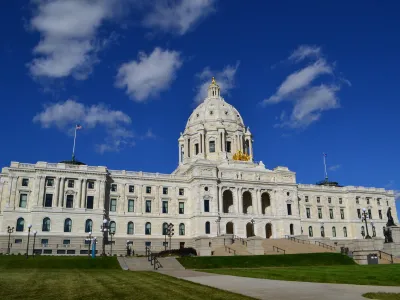Updates from the Minnesota Legislature

Published March 10, 2022
Hello from the State Capitol, where CUB is working hard to represent consumers’ interests in energy-related discussions. The Legislature passed its two-year budget last year. There is no pressure of a government shutdown should the politically divided House, Senate, and Governor fail to come to agreements, which may make it less likely that energy policy bills will be passed. That said, we do expect some action on energy items this year. Here’s some of what CUB is watching.
Intervenor compensation
CUB, together with the Energy CENTS Coalition, continue to advocate for updates to the law that allows people and public interest groups to have their costs of participating at the Public Utilities Commission (PUC) reimbursed under certain criteria. Current law allows such compensation only in general rate cases when a utility requests an increase to the base rate for electricity or natural gas. CUB’s bill would expand compensation to other types of PUC proceedings as well as to allow tribal nations to qualify. The bill is being carried by Representative Athena Hollins (HF 1289) and Senator Nick Frentz (SF 1621). (Here’s more about the bill.)
This bill was proposed last year and received hearings in the House and Senate energy committees. We worked hard to address concerns that were raised. This year, we have amended bill language that has the support of legislators from both parties and both the House and Senate. The Senate Energy and Utilities Committee gave the bill a favorable hearing on March 8, and we expect this bill to be part of an energy omnibus bill that will be negotiated later in the session.
Weatherization support
Minnesota will receive a significant boost in funding for the Weatherization Assistance Program. With the passage of the federal Infrastructure Investment and Jobs Act late last year, the program will have about $3.5 billion in 2022 nationwide. In contrast, about $315 million was available in 2021.
The Weatherization Assistance Program provides home upgrades including additional insulation, air leakage reduction, and furnace, boiler, or water heater repair or replacement. Successful projects can reduce annual energy costs by up to 30 percent. With such a large amount of funding available this year, more weatherization improvements than ever can be installed.
The Legislature is discussing proposals to help Minnesota be prepared to handle the big influx of funding, including addressing needed “pre-weatherization” improvements -- things like asbestos-containing insulation that must be removed or old wiring that must be replaced before weatherization upgrades can be made – and supporting the workforce to make the installations. At least one bill has been proposed so far (HF 3905-Bierman), and there will surely be more iterations as the legislative session progresses.
Residential customers’ dispute resolution process
A bill championed by the Legal Services Advocacy Project of Mid-Minnesota Legal Aid (SF 2947-Frentz/HF 3151-Stephenson) would allow individual residential customers of state-regulated utilities to appeal billing- or service-related complaints to the PUC if the complaint is not resolved by the PUC’s consumer affairs staff.
PUC staff accept customer complaints, and, as far as we are aware, are generally able to find resolutions that satisfy the customers making the complaints. However, in cases where staff do not resolve an issue to a customer’s satisfaction, the customer currently has no avenue to pursue their complaint further. This bill remedies that procedural dead end by allowing complaints to be elevated to the full PUC.
CUB supports this bill.
Raising utility acquisition cost limits
A bill championed by Xcel (SF 3225-Senjem/HF 3614-Long) would increase the threshold for which purchases, sales, or similar transactions by regulated utilities require preapproval by the PUC. Currently, transactions over $100,000 require preapproval. $100,000 is very little in the utility world, and it makes sense to raise that threshold. Discussions are ongoing around resetting the threshold to a level between $500,000 and $2 million.
Assistance with energy costs
There is interest from many legislators in providing assistance of some kind to help Minnesotans with rising energy bills. Last year, the legislature considered – but did not pass – bills to help with the spike in the cost of natural gas from the February 2021 winter storm. Similar proposals are under discussion this year, as are ideas to provide assistance for energy costs more generally. Multiple bills have been introduced (including SF 3691-Nelson, SF 3838-Tomassoni/HF 3944-Sanstede, and SF 3851-Johnson/HF 3521-Backer), but it is unclear at this point exactly what form such assistance might take if it were to advance this year.
Allowing securitization of utility costs
A bill introduced last year (SF 2322-Frentz/HF 1189-Long) would allow utilities to securitize (basically, to refinance using low-cost, ratepayer-backed bonds) the outstanding balance on aging power plants, so that they can replace those plants with less expensive, cleaner power generation. (Read more about the concept here.) Though it was not expressly permitted by the bill as introduced, securitization can also be used for large weather-related costs (like last year’s natural gas price spike) or other types of utility infrastructure that becomes obsolete before it is paid off.
A law change is needed to permit securitization in Minnesota. CUB supports such a change so that the tool is available. It is unclear whether the bill is likely to move forward this year.
Other topics
It is likely that the Legislature will pass a bill to grant funding from Xcel’s Renewable Development Account (a pot of money Xcel customers contribute to in exchange for the utility storing nuclear waste in the state). As in the previous several years, discussions are also ongoing around reforms to Xcel’s community solar program. And many other topics are being discussed.
We are in St. Paul representing utility consumers, and we will continue to share updates as the session progresses.